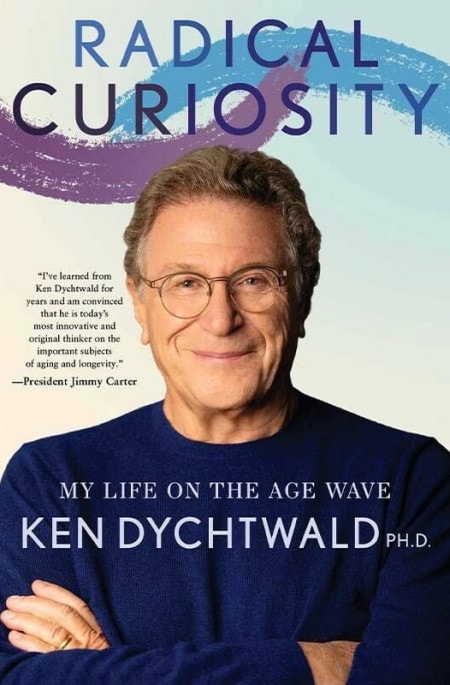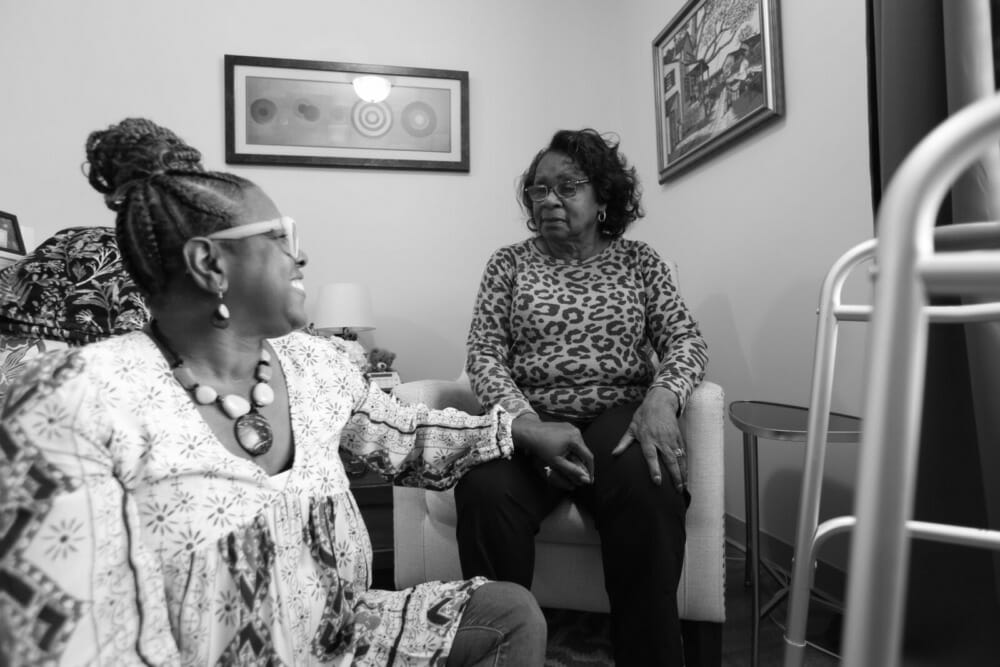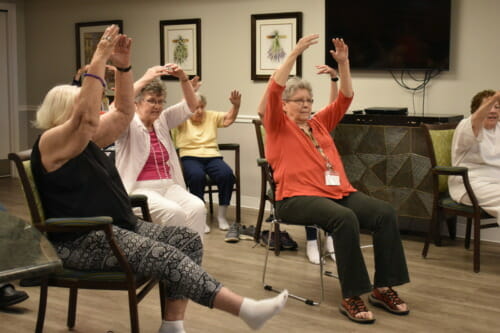Many Older Adults Think the Best Is Yet to Come Age Wave founder Ken Dychtwald takes close looks at his life and his generation, and finds reasons to be encouraged
Published September 13th, 2023 at 6:00 AM
Above image credit: A recent Age Wave survey found a majority of the respondents aged 65 and older believe their best years are happening now or are still ahead of them. (Courtesy | Getty Images)Ken Dychtwald has been watching, measuring and forecasting the aging of America for almost half a century, so it is hard to believe he could be surprised by much in his research of older adults anymore.
But like any curious and open-minded researcher, the 77-year-old founder of the Age Wave consulting firm in Orinda, California, was delighted to learn from a survey his firm had commissioned that a majority of survey respondents aged 65 and over say they believe their best years are happening now or are still ahead of them.
That optimism is not unlike the tone of Dychtwald’s memoir, “Radical Curiosity,” which he has updated with stories about the COVID pandemic and a harrowing account of his daughter-in-law’s battle with a flesh-eating bacteria.
A Conversation with Ken
Dychtwald recently took time to talk with Next Avenue about his research and memoir. Following is a transcript of the conversation, edited for length and clarity.
Next Avenue: Age Wave had the Harris Poll survey more than 2,000 adults in the U.S., including more than 900 people aged 50 and over, about shifting perceptions of aging and longevity. You have been asking similar questions and recording the answers for many decades. Was there anything in this survey that you found unexpected or new?
Ken Dychtwald: Yeah, there was actually. We asked people over 65 when was the best time in their life. Popular lore is that the best time in your life is when you’re young. But 71% of the respondents — and it was a representative group, not just happy people or wealthy people — 71% said the best time of their life is right now or it is still to come. That is extraordinary.
There was another interesting piece, which is changing perceptions of older people. Martha Stewart at 81 is on the cover of Sports Illustrated in a swimsuit. The Rolling Stones are in their 70s and 80s, and this month they are launching their first album in 20 years. And just because Oprah Winfrey is 69, she has no intention of allowing anybody to tell her what she can’t do. These examples keep popping up, and there’s not one or two but hundreds.
NA: What else surprised you?
KD: When we asked what’s more important as they grow older, being youthful or being useful, 83% of the older adult population said usefulness matters more than youthfulness.
Useful or Youthful?
NA: People crave purpose, yet our culture characterizes retirement as a time to relax and travel and so on. So what should older adults do? Keep working to make money or stop and enjoy themselves?
KD: My sense is a blend. You’re free from raising children. You may be free from having to work full time. You may be free from a boss you didn’t get along with. But you still may have 20 or 30 years in front of you. To have no usefulness during that massive stage of life, which I call The Third Age, seems like a profound mistake. Not only does society not take full advantage of all the wisdom and experience and knowledge and resilience of older people, but it also leaves a lot of older people not feeling instilled with meaning or purpose.
It’s understandable because when my grandparents’ generation reached their 60th birthday, they were happy just to be alive. We thought of retirement as a couple or three years of rest and relaxation before the batteries ran out. But we now people live long after they retire and we’re starting to realize, “Something’s changing here.”
U.S. Ranks Low on Health Span
NA: People, on average, are living longer than a generation ago. But not always better.
KD: Perhaps the most concerning thing in the Harris survey is the difference between lifespan and health span, and how badly we’re doing in the United States. We’ve been dreaming of living longer for tens of thousands of years, and we do live longer than our ancestors (although in 2020 and 2021, life expectancy in the U.S. fell nearly one full year, to 76.1 years, according to the CDC’s National Center for Health Statistics). But we have not necessarily created a healthy longevity for everyone.
If we’re going to live longer lives, we want those extra years to be a time for vitality, a time for well-being, a time for contribution, a time to enjoy our family, a time to try something new. And yet, we spend more money than any country in the world on health care, but there are 39 countries where people live longer than we do.
NA: Wouldn’t fixing that system be politically popular? Are candidates picking up the mantle?
KD: I’ve watched all the presidential debates for the last 20 years and I’m thrown by the fact that no candidate from either side of the aisle has talked about this and said, “There’s something terribly wrong here.” We’re ranked 68th in the world when it comes to health span, so we have a very serious problem in the United States.
Why the U.S. Ranks So Low
NA: Why hasn’t the United States done as well — or better — than at least some of the countries higher in the rankings?
KD: There’s a political dimension to this. Health spans are often organized around wealth. So wealthy people, who get access to the best doctors and the best medicine and live in healthy climates and safe homes, tend to live 10 to 15 years longer than poor people in this country. And that troubles me.
NA: How do we fix this?
KD: I’ve thought about it a lot. I’ve written 18 books now — eight or nine are on health. I’m not a doctor or a bio scientist, but I think that if we did three or four things, we could all live better, longer.
3 Steps to Improve
Number one, we need to do a better job of connecting science with health care in people’s minds. For every dollar we spend caring for people with Alzheimer’s and dementia, we spend less than a half a penny on breakthroughs that could wipe those diseases out. And that’s just plain wrong.

Number two, we need to make sure our health care practitioners are more skilled at dealing with the complex and often confusing problems of older people. I think that every cardiologist, oncologist and diabetologist ought to have some basic training in the complexity of the aging body. We don’t insist on that in this country, and as far as I’m concerned, it’s shameful and leads to polypharmacy and all kinds of mistakes.
Third, we should do more to persuade everybody and their loved ones to take better care of ourselves. I love living in a democracy. We can choose to eat, exercise or not. However, our level of self-care is problematic. You can get away with not exercising or being overweight when you’re 20 or 30. But when you turn 60 or 70, it catches up to you and it knocks away at your health span. We saw that during COVID, when we were all of a sudden talking about people who are immune suppressed, and hadn’t really given much thought to that before.
So better science, more competency in our health field, more user-friendly system, and more and better self-care. If we leaned harder on those fronts, we’d all have grander health spans, we’d all save trillions of dollars and we — as a country and as families — can live the kind of lives we’ve all been dreaming.
Why Older Adults Still Work
NA: Will increased longevity encourage older adults to continue working after reaching the traditional retirement age?
KD: There are two reasons why people want to keep working. One of them is that they’re getting wind of the idea that if they live longer, they might not have saved enough money and may need additional income to create financial security in their later years. But we also see from the study that an equal number of people say they want to keep working longer because they enjoy it. They like the stimulation. They like the challenge. They like the social connection.
NA: How far into their old age do older adults see themselves working?
KD: When do you think old age begins? People used to say around 60. When we ask now, the answer is 80 or 80-plus. It’s exciting that we’ve relocated the stages of life so we get to be young longer. We get to be “middlescent” for decades. I made that word up decades ago and I still like it better than “middle aged.”
Knowing What Matters in Life
NA: What are the favorite life lessons you write about in your memoir, “Radical Curiosity”?
KD: This may sound corny, but when I was young, I thought the things that mattered most in life are nouns: your car, your house, some thing.
When I got a little more Zen in my 30s, I began to realize that it was the verbs that mattered; it was the being, not the saying that made you the way you are.
When I got in my 50s, it struck me that it was an adverb, it was how you did what you did.
Now I’m more and more convinced that punctuation matters most: taking a moment to stop and tell the person you love that you love them — and, by the way, it could be your partner, or it could be your best friend. It could be your dog. Just take a few minutes and have a ritual of saying I love you and I want to be with you.
Mark A. Stein is an editor at Next Avenue, where this story first appeared. Over the course of his career, he has been a reporter at the Los Angeles Times, an editor at The New York Times and Bloomberg News in London, and started a website for Conde Nast Publications.
Support for “Age-Old Questions” is provided by William T. Kemper Foundation, Commerce Bank, Trustee. Additional support is provided by Husch Blackwell.





